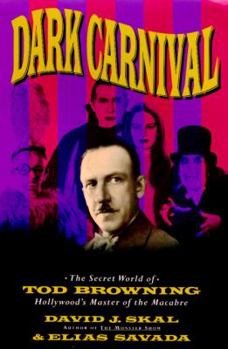Dark Carnival
Select Format
Select Condition 
Book Overview
One of the most original and unsettling filmmakers of all time -- the creator of the horror classics Dracula and Freaks, among others-- Tod Browning is also one of the most enigmatic directors who... This description may be from another edition of this product.
Format:Hardcover
Language:English
ISBN:0385474067
ISBN13:9780385474061
Release Date:October 1995
Publisher:Doubleday Books
Length:359 Pages
Weight:1.60 lbs.
Dimensions:1.2" x 6.4" x 9.6"
Customer Reviews
4 ratings
Very in-depth
Published by Thriftbooks.com User , 16 years ago
A fantastic insite into one of my favourite directors,the coverage on 'freaks'is superb,a lot of photos & a complex read-recommended highly!
Nightmare Theater
Published by Thriftbooks.com User , 16 years ago
Tod Browning remains one of the most enigmatic directors in Hollywood history. Born and raised near Louisville, Kentucky (as was his early cinematic mentor, D. W. Griffith), Browning had an unusual life. His uncle, Pete Browning, was one of the best professional baseball players of the nineteenth century, but ended his life in a sanitarium. Tod Browning spent a significant period of time working in a carnival. These experiences prepared him for one of his most unusual films, "Freaks," which effectively halted his career in Hollywood thirty years later. After leaving the carnival circuit, Browning drifted into acting and eventually appeared in a few silent movies for Griffith. Having survived a nearly fatal automobile crash, Browning turned his attention to directing films of his own. During the silent film era, Browning became closely associated with Lon Chaney. Chaney's willingness to endure severe make up preparations of his own design allowed Browning to cast him in tales of alienation, criminality, perversity and suffering. In stark contrast to the sunny films that were typical of the period, Browning depicted a world in which betrayal was commonplace and brutality, insanity, sadism and cruelty were the norm. Lon Chaney's sudden death due to throat cancer brought about the recasting of "Dracula" and made Bela Lugosi an iconic star. During the production of "Dracula" the film's budget was repeatedly cut by the cash strapped executives at Universal Pictures. The final reels of the film are little more than a filmed stage play unlike the introduction to the picture which opened the Bram Stoker novel up considerably from its successful theatrical adaptation. Browning needed a hit film badly and "Dracula" did not disappoint. Within a few years, however, Browning's career began to spiral downward. His directorial techniques were seen as dated and excessively stagy. "Freaks" was deemed to be objectionable by many people and one marvels that the film was ever approved for production by the studio and permitted to be exhibited by the censors. After the release of "Devil Doll" with Lionel Barrymore, Browning was effectively finished as a director. The authors are to be commended for revealing something of an influential if almost inscrutable Hollywood pioneer.
where else?
Published by Thriftbooks.com User , 21 years ago
Will you find this much detail about Browning. That alone gets Skal's effort the highest rating. Fascinating material.
A top-notch biography of a difficult subject
Published by Thriftbooks.com User , 25 years ago
Director Tod Browning, best known for his films "Dracula" (1931) and "Freaks," was a surrealist for the masses. In his films he used characters with mental and physical abnormalities to illustrate the plight of humanity diminished by modernism. He was one of the first horror auteurs in America, and filtered elements of the fantastic from European film makers like Robert Weine and F.W. Murnau. As an artist, he was uneven, and as the subject of a biography, he is all but unknowable, but David J. Skal does the best he can. Some sections of the book (especially the ones covering Bela Lugosi and the making of "Dracula") retread earlier work by Skal. Browning is also not the best subject for a biographical treatment, since he left almost no letters or personal effects. Instead of resorting to guesswork or pop psychology, however, Skal (with his collaborator Elias Savada, a film historian) wisely focuses on the content of Browning's films. The best sections of the book deal with Browning's frequent silent movies collaborations with Lon Chaney, Sr., and the making of, and subsequent furor over, the film "Freaks." This is a top notch book that should appeal greatly to film buffs, lovers of silent cinema, Hollywood historians, cultural critics, and horror fans of all stripes. (And compleatists and trainspotters will be happy to know that the filmography is both detailed and exhaustive.)






